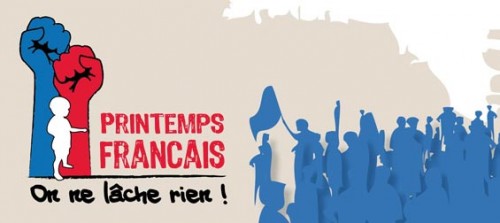mardi, 23 avril 2013
How are Revolutions Born?

How are Revolutions Born?
By Dominique Venner
Ex: http://www.counter-currents.com/
Translated by Greg Johnson
The birth of revolutions is a fascinating, quite relevant, and little-known topic. It was studied by the sociologist Jules Monnerot (1908–1995) after the French events of May 1968 in his book Sociologie de la Révolution [Sociology of Revolution] (Paris: Fayard, 1969). A valuable work for which the author has forged a series of concepts applicable to all situations.
As a sociological study and not one in the history of ideas, Monnerot uses one term, “revolution”—without, of course, ignoring all that separates and opposes the various revolutions of the 20th century: Bolshevism, Italian Fascism, German National Socialism, the French revolutions of 1944 or 1968. Indeed, he applies the same sociological analysis to these mass phenomena while making a clear distinction between conservative revolutions and deconstructive revolutions.
To begin, Monnerot defines some concepts applicable to any revolution. Firstly, the “historical situation“: it is one we’ll never see twice. This is true for 1789, 1917, 1922, 1933, or 1968. Another complementary notion: the “situation of distress.” It is characterized by uncontrolled disturbances. The social structure is defeated: the elements are no longer in place.
When a society is stable, we can distinguish normal (“homogeneous“) and marginal (“heterogeneous“) social elements. Marginal elements are marginal because they are maintained by the pressure of “homogeneous” elements. When a critical threshold of upheaval is reached, the homogeneous part begins to dissociate. Chaos then becomes contagious.
An interesting observation that applies to conservative revolutions: “the homogeneous, even in dissociation, remains homogeneous.” When the upheaval is radical, “the very foundation of society mounts a demand for power.” Fascism, in 1922 or 1933, for example, was a response to this demand in a highly developed society (industry, science, culture). In such a society, when order collapsed, the conservative elements (homogeneous) become temporarily revolutionary in their desire for order and demanded power.
How do we arrive at a “revolutionary situation“? Monnerot’s synthetic response: deficiency at the top. A regime crisis is characterized by a “plurality of conflicts.” Any exception to the authority of those in power, and disorder becomes endemic. The society “boils over.”
This effervescence is not revolution. It is a phase, a time, with a beginning and an end (a cooling down) when the medium “is no longer combustible.” When the excitement dies down, the same people are not in command (Robespierre was replaced by Napoleon, Trotsky by Stalin, Mussolini by Balbo).
The revolutionary and turbulent condition involves the “masses.” These are momentary coagulations, troops of revolution. To lead the masses, to give them a nervous system, the Jacobins and Lenin (much more efficiently) developed the instrument of the party.
What Leninists called “the radicalization of the masses” is a tendency to politicize those hitherto conformist and little inclined to be passionate about the public good (those who above all ask the state to do the job of the state). When it enters a phase of turmoil, “society is traversed in all directions intense emotional reactions, like iron filings in a magnetic current.”
Situations of distress bring to the fore violent elites: the “subversive heterogenes,” the irregular and marginal that the customary barriers cannot stop. They give the movement the force to break through.
In a revolutionary situation, the painful lack and need of power can force social elements that aspire to order down the road to revolution. “A time comes when the Arditi or young Baltic lancers,[1] previously regarded as reprobates, appear more reassuring than worrisome to the most homogeneous part of the population. They seem to embody, through misfortune, the values of courage, bravery, and character without which there is no great country. . . . Even those who are not supporters think they should be allowed to try.” This is a good summary of exceptional historical situations. But, as Monnerot specified, the “historical situation” is that which never arises twice.
In the France of 2013, we are entering a “historical situation”? Not yet, surely. But there are signs that it may head toward such an unforeseen situation. Will it be all that it promises? It is too early to say. But nothing is impossible.
Source: http://www.dominiquevenner.fr/2013/04/comment-naissent-les-revolution/ [2]
Translator’s Note
1. The Arditi were the Italian shock troops of the First World War, many of whom became Fascist Blackshirts. Baltic lancers probably refer to the German Freikorps veterans who played a similar role in the National Socialist movement. I wish to thank Robert Steuckers for clarifying the latter point. If Monnerot is alluding to a specific individual, please email me at: editor@counter-currents.com.
Article printed from Counter-Currents Publishing: http://www.counter-currents.com
URL to article: http://www.counter-currents.com/2013/04/how-are-revolutions-born/
URLs in this post:
[1] Image: http://www.counter-currents.com/wp-content/uploads/2013/04/franceprotest.jpg
[2] http://www.dominiquevenner.fr/2013/04/comment-naissent-les-revolution/: http://www.dominiquevenner.fr/2013/04/comment-naissent-les-revolution/
00:05 Publié dans Actualité, Affaires européennes, Nouvelle Droite | Lien permanent | Commentaires (0) | Tags : france, europe, actualité, affaires européennes, dominique venner, nouvelle droite, jules monnerot, printemps français |  |
|  del.icio.us |
del.icio.us |  |
|  Digg |
Digg | ![]() Facebook
Facebook
dimanche, 21 avril 2013
What's Driving France's Surprising Anti-Gay Marriage Protest

The French Spring
Paris.
This year, the spring in France is unusually cold and rainy, coming up after the frosty and long winter. Only last Sunday was different: the sun pushed the clouds away, for the first time for a few months, and immediately the lucid Parisian air warmed up and trees broke in full bloom. The French were cheered up after long gloom and went to demonstrate against neoliberal policies of their new ostensibly socialist government. This Blairite ‘socialism’ is symbolised by the new gay marriage and adoption bill that the government tries to push through the Parliament despite popular rejection. The French police, brutal as ever, wielded batons, tear gas and arrested the demonstrators. Sixty-seven of them were in prison after the mammoth manifestation of March 23. (They apparently were released). The newspapers speak of the French Spring, echoing the Arab one.
The new President Francois Hollande is quite unpopular; his ratings are the lowest of any French president since presidential popularity began to be rated in 1981. For the simple reason: his socialist party continues with the same neoliberal policies, this time in agreement with the tame trade unions. The Wicked Witch of the West is dead, but her spirit is still with us. The ministers have offshore accounts they previously denied. By the new ‘national agreement’ (ANI), the employers will be allowed to extend working hours, to reduce salaries to the minimum and to enforce «working mobility» by sending workers to far-away plants. If they refuse they can be fired without compensation. The family allowances shrink, the pensions stagnate and do not keep up with the inflation. France, like the rest of us, was robbed by the bankers, and the working people are left to pay the bills. The families of French workers have difficulty to have their ends meet. They view the gay marriage and adoption bill as a part and parcel of this neoliberal attack on their lives.
In order to become a law, the bill had to be approved by the Senate and then it should come again to the National Assembly, the lower house. Recent protesters manned a picket for the time of the debates, starring Cardinal Barbarin, the Archbishop of Lyon, the Primate of the Gauls and the second highest ranking man in the Catholic Church in France. Still the Senate approved the bill with wafer-slim majority of two votes, both given by deserters from the Gaullist party representing the French overseas. Now the tents of the protesters are pitched in front of the National Assembly, and the police expects more trouble for April 23, the day of the final vote brought forth by the government.
The socialist party and its allies, soft Communists and Greens, still insist on the unpopular bill. They care more about their sponsors, rather than for the ordinary French families who hardly can feed their own children, say their opponents.
The biggest manifestation of March 23 against the bill gathered over a million participants in Paris alone. The French police claimed there were only three hundred thousand protesters. They learned from the American repression of the Occupy movement and falsified the photos of the demo. On the protesters’ site one can see the sloppily Photoshop-doctored photos: in order to fit their numbers, police erased not only the marchers, but the dividing lines and trees off the Avenue de la Grande Armee near the Arc de Triomphe.
The French people are really upset by the bill. Traditionally extremely tolerant to all sexual proclivities, they justifiably refuse to see it as a “struggle for gay rights.” For them, this is a new step towards the Brave New World of tube-manufactured children, towards inhumane capitalism where money buys all and ordinary working people are deprived of everything: of steady work, of respect, of families, of homes and even of their children.
The supporters of the bill are pushing with their standard soft-leftist agenda of caring for everybody – gays, lesbians, immigrants – but the working class majority who are castigated as “bigots, homophobes and anti-semites”. Indeed they took a leaf from the pro-Israel supporters (who always defend their untenable positions by crying “antisemitism”) and bewailed the “homophobia” of the protesters. They claimed that a gay was beaten up somewhere, and that the protesters (sic!) were guilty of incitement, though there is a considerable and well-publicised body of Gays against the Bill who joined the demo and fought the bill together with the rest of the French.
Of course, adoption agencies support the bill. Each adoption brings tens of thousands dollars to the agencies, and now they will have new clients. Middle Eastern wars like the Syrian civil war encouraged by France will provide the desired orphans. Or not necessarily orphans: there was a famous scandal when the agencies imported children for adoption from war-savaged Darfur. The children were stolen or bought from their parents. Some of them allegedly ended up in the organ transplantation clinics.
The new bill will boost the intermediaries who supply surrogate mothers from the former colonies and poor Third World countries; the courts enforce the contacts so these women will have to part with their babies whether they want it or not. Indeed the new neoliberal law restores slave trade to the position it lost in 19th century. Moreover, bearing in mind the opening for transplantation, it can restart a neo-cannibalism, too.
Europe is in bad shape. This year I surfed on the crest of early spring through many small towns and villages of France, Italy, Spain; the old continent is dying out. The houses stay empty and boarded up; only tourists and immigrants remain at large. The big cities are overcrowded, the rest is dead, as if the dreadful prophecy of Iliya Ehrenburg (detailed in his 1920s novel DE Trust) that big money will destroy Europe, came true. The good old Europe was destroyed by combination of Right and Left policies. Thatcher (and her counterparts in European countries) eliminated the working class, industry, education; shifted incomes from ordinary people to the rich; afterwards, came Blair (and his counterparts elsewhere) and completed the job, by destroying the family and planting his surveillance cameras on every courtyard. The right created debts, the left came to collect and pay the bankers.
Israel Shamir is now in France, and he can be reached on adam@israelshamir.net

00:05 Publié dans Actualité, Affaires européennes | Lien permanent | Commentaires (0) | Tags : france, europe, affaires européenne, printemps français |  |
|  del.icio.us |
del.icio.us |  |
|  Digg |
Digg | ![]() Facebook
Facebook


